holoscience.com | The ELECTRIC UNIVERSE®
A sound cosmology for the 21st century
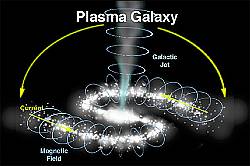
“Science Heading for a BIG BANG”
Forget the glossy astronomy books and magazines – the Big Bang is pure fiction. The discoveries that prove it will also bring about the end of science-as-we-know-it. Of course, many books and articles have been published recently heralding the end of science – meaning there is little left to learn. The truth is the opposite. Much of what we think we know “ain’t so”. As always, unlearning it will give us more trouble than learning something new.
The belief of scientists in their cleverly concocted creation story, the Big Bang, has become so entrenched and over-hyped that it is difficult to imagine an effective face-saving strategy when the news leaks out that it is nonsense. And let there be no doubt about it, the hard science to prove the case against the Big Bang has been done by an astronomer who is uniquely well placed for the task.
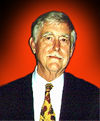 His name is Halton Arp, known for his classic work in “Arp’s Atlas of Peculiar Galaxies”. When he began to announce findings nearly 30 years ago that contradicted orthodox cosmology he was refused telescope time and publication in the standard journals. In frustration he published two books, the first in 1987 titled “Quasars, Redshifts and Controversies”, and more recently “Seeing Red”. “Redshift” is the term used to describe the shift in frequency of spectral lines toward the red end of the spectrum. It’s known to occur when an object is speeding away from us. Edwin Hubble discovered that the luminosity of a galaxy is related to its redshift: the fainter the galaxy, the higher the redshift. He suggested one interpretation of this data is that the greater the redshift (and therefore, the velocity), the farther away the galaxy. Thus, the expanding universe was born. But he was careful not to assume that this was the only possible interpretation of the redshift data. Others since have thrown scientific caution to the winds and used Hubble’s hypothesis as a rubbery yardstick with which to measure the size and age of the universe. Arp avoided this unscientific approach and made discoveries that are unequalled in the history of astronomy.
His name is Halton Arp, known for his classic work in “Arp’s Atlas of Peculiar Galaxies”. When he began to announce findings nearly 30 years ago that contradicted orthodox cosmology he was refused telescope time and publication in the standard journals. In frustration he published two books, the first in 1987 titled “Quasars, Redshifts and Controversies”, and more recently “Seeing Red”. “Redshift” is the term used to describe the shift in frequency of spectral lines toward the red end of the spectrum. It’s known to occur when an object is speeding away from us. Edwin Hubble discovered that the luminosity of a galaxy is related to its redshift: the fainter the galaxy, the higher the redshift. He suggested one interpretation of this data is that the greater the redshift (and therefore, the velocity), the farther away the galaxy. Thus, the expanding universe was born. But he was careful not to assume that this was the only possible interpretation of the redshift data. Others since have thrown scientific caution to the winds and used Hubble’s hypothesis as a rubbery yardstick with which to measure the size and age of the universe. Arp avoided this unscientific approach and made discoveries that are unequalled in the history of astronomy.
Many peculiar galaxies turn out to be what are known as active galaxies. They are often seen to have thin jets of matter firing from their cores, and bridges of matter or radio lobes connecting them with nearby objects. Arp noticed that quasars are clustered in the sky with active galaxies far too often to be a coincidence. Quasars are faint starlike objects whose spectra are highly redshifted. The Big Bang view is that their redshifts are due to the expansion of the universe and the doppler effect as the quasars race away from us at a good fraction of light speed. A high redshift equates in that model to great distance so they should have no association with much closer galaxies. Yet Arp showed that some quasars are connected by bridges or jets of matter to active galaxies. Since the advent of orbiting x-ray telescopes these bridges are becoming abundantly clear.
But now we come to the results of Arp’s work that will shake the foundations of modern physics. He found that quasars lined up on either side of active galaxies as if they are spat out at regular intervals from the galactic cores, above and below the plane of the galaxy. He then found that the redshifts of these quasars fall back toward normal levels and increase in brightness the further they are from the parent galaxy. In other words, the redshift is a measure of the age of the quasar. Also, the quasars slow down as if they are increasing in mass.
Even more shocking was Arp’s discovery that quasar redshifts are quantised! IF SCIENCE WORKED AS ADVERTISED, THIS SHOULD BE BANNER HEADLINE NEWS! This raises the specter that our highly prized physics is way off the beam; that we do not understand such fundamental concepts as mass and gravity, nor the real meaning of quantum theory. So our university libraries and bookshops are crammed with science fiction. Nothing short of the biggest conceptual revolution in history will redress the situation. But universities are not in the business of fostering revolutions and the media seems incapable of exposing their nonsense. Based on his experiences Arp wrote, “Investigative journalism so far as science is concerned is dead in the water.” He believes that with such a broken-down way of doing and reporting science, breakthroughs must come from individuals outside academia.
It is happening. The signs of revolution have been around for decades. But with their backs turned to us and absorbed in their computer screens, those who have derailed science are oblivious to the “Big Bang” that is about to occur. As David Stove, the noted Australian philosopher, wrote in Anything Goes: “Everyone dislikes a sudden loud noise, but it is worse still if you are half asleep at the time.” We can expect a bad-tempered reaction when it occurs.
The famous mathematician Johann von Neumann seemed to intuit the problem at the heart of the mathematical physics approach when he wrote: “In mathematics you don’t understand things. You just get used to them.” Meanwhile a growing number of independent thinkers have noted that physics lost any remaining connection with reality with the advent of relativity theories and quantum mechanics. Paradoxically, the way forward is to return to classical physics which is based on immutable standards and causality. The equations of modern science are merely descriptive and not causal explanations. The same equations may apply to many different causes. Relativity introduces “rubbery” rather than immutable standards. Mass, length and time change with velocities and observers. As the philosopher Michael Miller [dead link 2021] puts it:
“If a measuring standard varies who-knows-how, then the quantities measured by means of it vary who-knows-how, and the equations connecting those quantities mean who-knows-what. This is precisely the bog in which relativists have mired themselves; their doctrine of curved space is symptomatic. …Generations of science students have tried to make sense of curved space, and succeeded only in warping their minds.”
As with past revolutions, the seeds are already sown. A good scientist would be alert, without prejudice, to wider future possibilities. Unfortunately, academia teaches and encourages prejudice and a narrow focus. Arp goes so far as to compare the dogmatism of astronomy unfavorably to that of the medieval church. It is the mission of HOLOSCIENCE to look at the BIG PICTURE and find the promising ideas that could form the new science of this new millennium. Arp’s observational work on intrinsic redshift is already a cornerstone for a new cosmology. It depicts a smaller, stable cosmos as part of an infinite, eternal universe. It has almost biological overtones when it traces families of galaxies with quasars being the galactic children in various stages of adolescence.
There are two key elements required to explain the dynamics of quasar formation and quantization of redshift. An article featured in the March-April issue of American Scientist drops the first shoe. It demonstrates (again) that plasma physics holds the key to understanding stars and galaxies and the inexplicable (in gravitational terms) ejection of vast gobs of matter at colossal speeds.
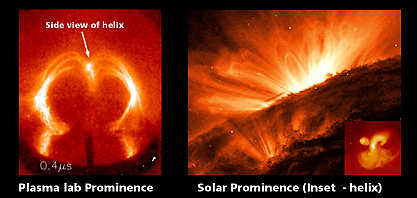
Experiment shows that a powerful electric current in a magnetic field can create a solar coronal mass ejection event (CME). And since magnetic fields are caused by electric currents, the prime mover is electric discharge phenomena in a plasma. From personal experience, electric discharges in plasmas are not a part of the curriculum for astrophysicists. Cosmology should be the realm of plasma physicists and electrical engineers.
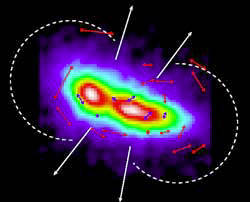

Another recent example: British astronomers have discovered a “magnetic bubble” around one of Arp’s favorite galaxies, M82. Notice that astrophysicists always deal with effects (winds, magnetism) and not causes (electric currents). The diagram of M82 is almost identical to that of the plasma physicist, Eric Lerner, in his book “The Big Bang Never Happened”, published in 1992.
In that book, a simple, highly compact and efficient ejection engine is described – the plasma focus.
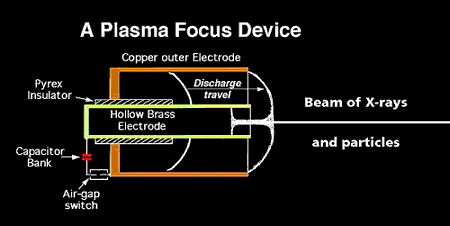
It can explain simply the episodic ejection of quasars from the centers of active galaxies. In an ELECTRIC UNIVERSE® infinitely heavy objects are not needed to offset the infinitely weak force of gravity when explaining high-energy outbursts. Black holes and neutron stars simply do not exist. The electrical nature of matter prevents the formation of super-massive objects.
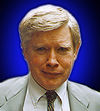 The second shoe is dropped heavily by the physicist Ralph Sansbury who has been using his own resources to experiment with laser light and show that there are near-instantaneous electric forces that can account for light, magnetism and gravity. In other words, the electric force is fundamental and all others are derived from it – even the nuclear force. The quantum nature of matter interactions are then seen in a classical sense to be due to electrostatic resonances operating at near-infinite speed between sub-particles that constitute electrons, protons and neutrons. Causality is reinstated in physics. IF SCIENCE WORKED AS ADVERTISED, THIS SHOULD BE BANNER HEADLINE NEWS! (And Ralph wouldn’t be working alone in his basement). In the view of HOLOSCIENCE, this is the only model that can sensibly explain Arp’s galaxy-wide quantum jumps in redshift.
The second shoe is dropped heavily by the physicist Ralph Sansbury who has been using his own resources to experiment with laser light and show that there are near-instantaneous electric forces that can account for light, magnetism and gravity. In other words, the electric force is fundamental and all others are derived from it – even the nuclear force. The quantum nature of matter interactions are then seen in a classical sense to be due to electrostatic resonances operating at near-infinite speed between sub-particles that constitute electrons, protons and neutrons. Causality is reinstated in physics. IF SCIENCE WORKED AS ADVERTISED, THIS SHOULD BE BANNER HEADLINE NEWS! (And Ralph wouldn’t be working alone in his basement). In the view of HOLOSCIENCE, this is the only model that can sensibly explain Arp’s galaxy-wide quantum jumps in redshift.
The argument goes like this: a quasar is ejected from a galactic nucleus by the plasma focus effect as an electron-deficient plasmoid (electrons are trapped in the focus longer than the much heavier protons). Now, the phenomenon of mass is due to the energy conserving elastic response of charged particles to external electric forces. If gravity is an electric force, inertial and gravitational mass will always be identical. So, because the electric polarization of stars in the quasar is low at first, the mass of protons and neutrons will be lower than in the parent galaxy.
Consequently electron orbits within quasar atoms will have lower energy – light from them will be redshifted. Luminosity will also be lower due to the lack of charge-carrying electrons. Electrons streaming after the quasar create an x-ray jet and vast radio-lobes. Such electron jets are seen clearly in images from the orbiting Chandra X-Ray telescope.
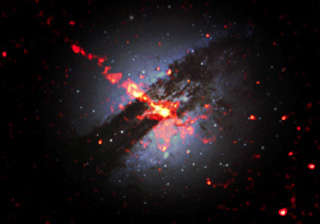
As electrons arrive at the quasar, the luminosity increases at first and mass and redshift undergo quantum jumps to new resonant states across the quasar or galaxy.
From a NASA news report issued on April 19:
“The distance record for a quasar has been broken yet again. At the present time, no other object in the universe has been found to be more distant than the above speck. The recently discovered quasar has been clocked at redshift 5.82. The exact relation between redshift and distance remains presently unknown, although surely higher redshifts do mean greater distance. The above quasar is likely billions of light-years away and so is seen when the universe was younger than one billion years old, less than a tenth of its present age. Like all quasars, this object is probably a large black hole in the center of a distant galaxy.”
Blah, blah….
Has NASA suddenly become uncharacteristically coy about the meaning of the redshift? The use of the word “surely” implies a question mark.
It is usual in academia to ignore and ostracize a dissenter in the hope he will give up. But Arp is not a quitter, he is a big hitter. If ostracism fails then scientists rewrite history as if they really knew it all along. The first step in that process is to equivocate in scientific reports to allow a new interpretation to be introduced retrospectively. Watch carefully!
Wal Thornhill
Credits: Photograph of Ralph Sansbury: Wal Thornhill.